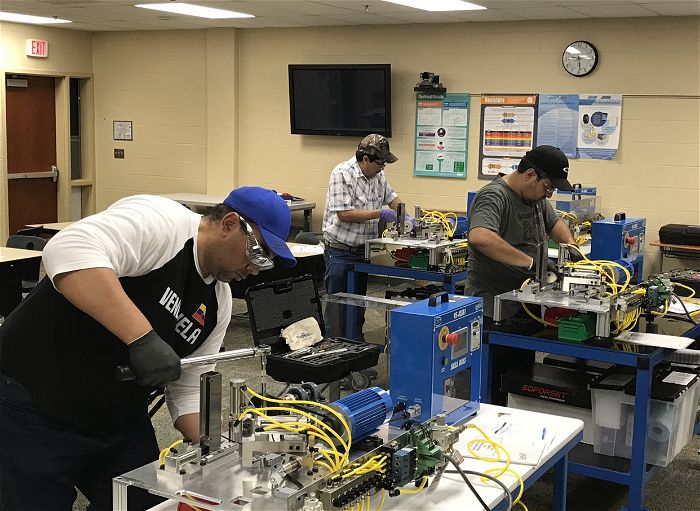
Apprenticeship Is Vital to Manufacturing's Post-Pandemic Recovery
May 29, 2020
At a Glance
As we emerge from the COVID-19 crisis, apprenticeship can play an important role in efforts to foster an equitable economic recovery as a key component of new talent development programs and efforts to retrain or upskill current workers.
The COVID-19 pandemic has hit the manufacturing industry hard, and apprenticeship may be one strategy toward a stable recovery.
As the novel coronavirus spread across the country and around the world, many manufacturers had to cut back operations and lay employees off. These moves contributed to the overwhelming surge in new claims for unemployment benefits, which had surpassed 40 million in just ten weeks as of May 23.
Some companies were able to revamp their operations and pivot to producing much-needed goods like personal protective equipment and coronavirus test kits. But when the National Association of Manufacturers surveyed its membership in early March, more than 78 percent of the 558 respondents said they expected the pandemic to have a negative financial impact on their businesses, and 53 percent said they anticipated operational changes as a result of the crisis.
Time to Prepare for a New Normal
Suffice to say that manufacturers will have to reassess and adjust their operations as the COVID-19 crisis abates and they prepare for the “new normal.” One area where a new approach will be especially important is talent development and training, because in the post-pandemic economy, manufacturers will need more versatile workers, they will be more cognizant of the need to transfer knowledge from older workers to younger workers, and they will have to put a renewed emphasis on workplace safety.
JFF believes that apprenticeships can be an effective means of addressing those three workforce concerns. Let’s examine the role apprenticeships could play in helping manufacturers address each one.
Manufacturers will need workers who are flexible enough to deal with change and nimble enough to take on new tasks and juggle multiple responsibilities.
More Versatile Workforce
Manufacturers that are still up and running and those that will be re-opening soon are redesigning their facilities and work processes. They need to be able to maintain operational efficiency while ensuring that the work environment allows employees to adhere to social distancing guidelines. They will need workers who are flexible enough to deal with change and nimble enough to take on new tasks and juggle multiple responsibilities.
Apprenticeships can provide the training framework that manufacturers need to build an agile post-COVID workforce. As part of the apprenticeship design process, employers identify the competencies required for a position and then help to develop the technical instruction that backs up what apprentices learn on the job. That approach allows employers to tailor training programs to meet their unique needs and regularly update the programs as those needs change. In addition, because the process requires employers to document the knowledge and skills needed for various positions, it enables them to create assessment tools to evaluate whether workers are being properly trained.
Knowledge Transfer
Even before the pandemic, the manufacturing industry was dealing with an aging workforce and a skills gap that made it difficult to find younger workers to fill vacancies created when baby boomers retired. That staffing challenge resulted in a loss of institutional knowledge, because older workers often left before they had a chance to share information and insights with their younger replacements. The COVID-19 pandemic is further highlighting the importance of transferring knowledge from older workers to younger workers before it’s too late.
Apprenticeship programs can help solve the knowledge transfer problem because they create opportunities for older workers to interact with younger colleagues.
For example, apprenticeships include mentoring arrangements in which apprentices are paired with more experienced colleagues who offer guidance and instruction to the trainees and assess their progress. As part of these relationships, veteran workers ensure that their young charges acquire the skills and insights that they learned over decades of work.
Experienced workers, or even retirees, can also participate in apprenticeships by serving as classroom instructors, and thereby share knowledge with multiple apprentices at once.
Safety has become even more important during COVID-19 pandemic, and planning for new hazards that may emerge will take on added urgency.
Increased Commitment to Safety
Given the risks involved in working with heavy machinery, hazardous chemicals, and other potentially harmful materials, worker well-being has always been a concern in the manufacturing industry. Safety has become even more important during the COVID-19 pandemic, and planning for new hazards that may emerge will take on added urgency.
Apprenticeship programs can help manufacturers improve workplace safety. Regulations require apprenticeships to include training in safe work practices and to ensure that participants learn how to report unsafe conditions.
Apprenticeships typically focus on the safety concerns that are relevant to an employer’s industry or specific occupations, but given the flexibility of the apprenticeship model, training programs can be modified to address concerns related to COVID-19, including the need to understand virus-related symptoms and procedures for responding to workplace outbreaks.
We have a shared responsibility to lay the foundation for an equitable economic recovery.
JFF Can Help Advance Apprenticeship
JFF is available to help manufacturers interested in setting up apprenticeship programs to address new priorities that arise during the post-pandemic recovery.
Led by our Center for Apprenticeship & Work-Based Learning, we have been at the forefront of the modern apprenticeship movement, and we have called on everyone who believes in this important worker training model to continue to advance apprenticeship during the pandemic-driven economic downturn.
We have assembled a team of experienced apprenticeship practitioners who work with employers to build programs that meet their training needs and adhere to industry standards. And we have a good deal of experience with apprenticeship in the manufacturing industry. For three years, through a U.S. Department of Labor Industry Intermediary contract, we have worked with nearly 1,000 employers—including Lockheed Martin, John Deere, Hypertherm, Impresa Aerospace, and Syracyse Label & Surround Printing—to develop and expand apprenticeship programs. Those efforts yielded almost 3,000 enrollments in apprenticeships for manufacturing occupations, including computer numerical control machine operator, mechatronics technician, tool and die maker, and aerospace engineer.
As we emerge from the COVID-19 crisis, we have a shared responsibility to lay the foundation for an equitable economic recovery. Apprenticeships can play a vital role in those efforts as a key component of new talent development programs and efforts to retrain or upskill current workers.
Related Content

Center for Apprenticeship & Work-Based Learning
This tried-and-true training model has been around for so long because it works. JFF is a leader in expanding apprenticeship and work-based learning to new industries and professions. This tried-and-true training model has been around…

Widen the Net: A Sensible Way to Increase the Supply of Skilled Labor in Manufacturing
By mining sources such as those and cultivating a diverse workforce, manufacturers have an opportunity to not only alleviate the pressure of the talent shortage they’re facing today, but also drive innovation and business growth.

Growing Opportunities in Manufacturing through Bilingual Upskilling
The bilingual GOAL training program provides opportunities for English Language Learners to progress in advanced manufacturing careers. The bilingual GOAL training program provides opportunities for English Language Learners to progress in advanced manufacturing careers. This…